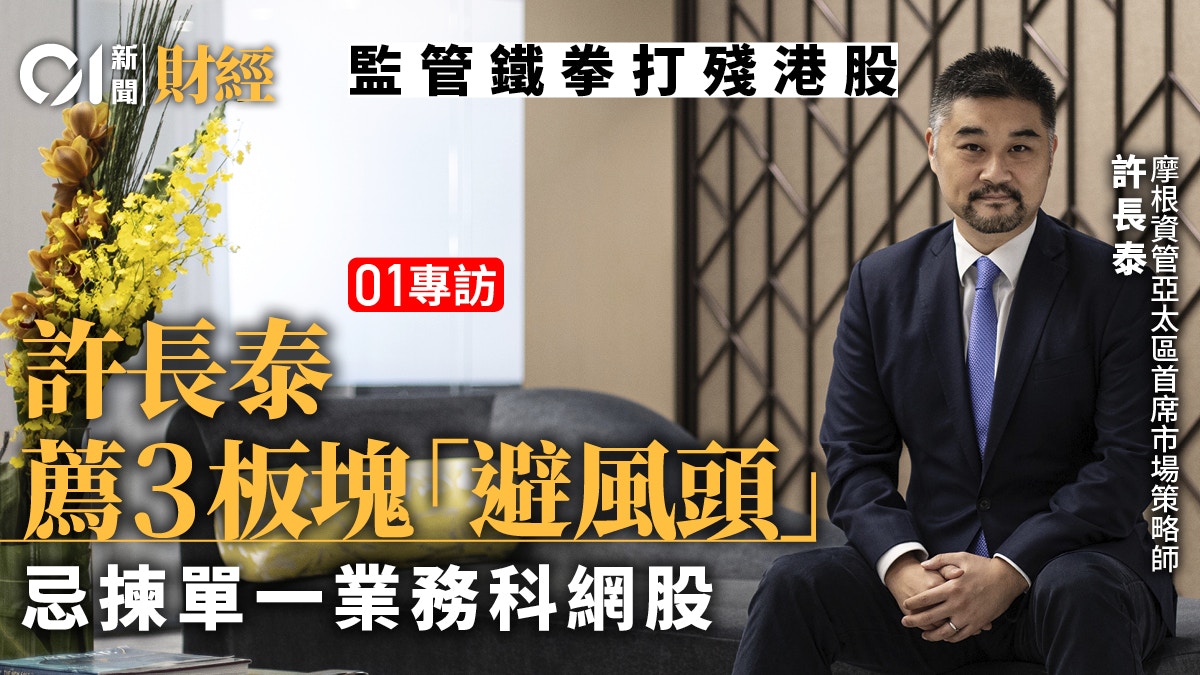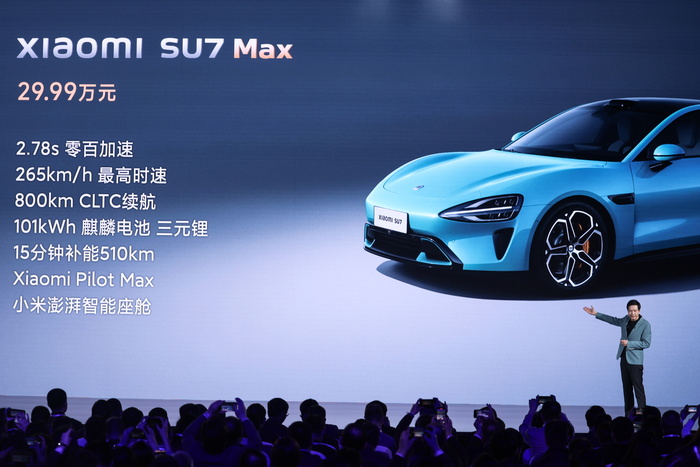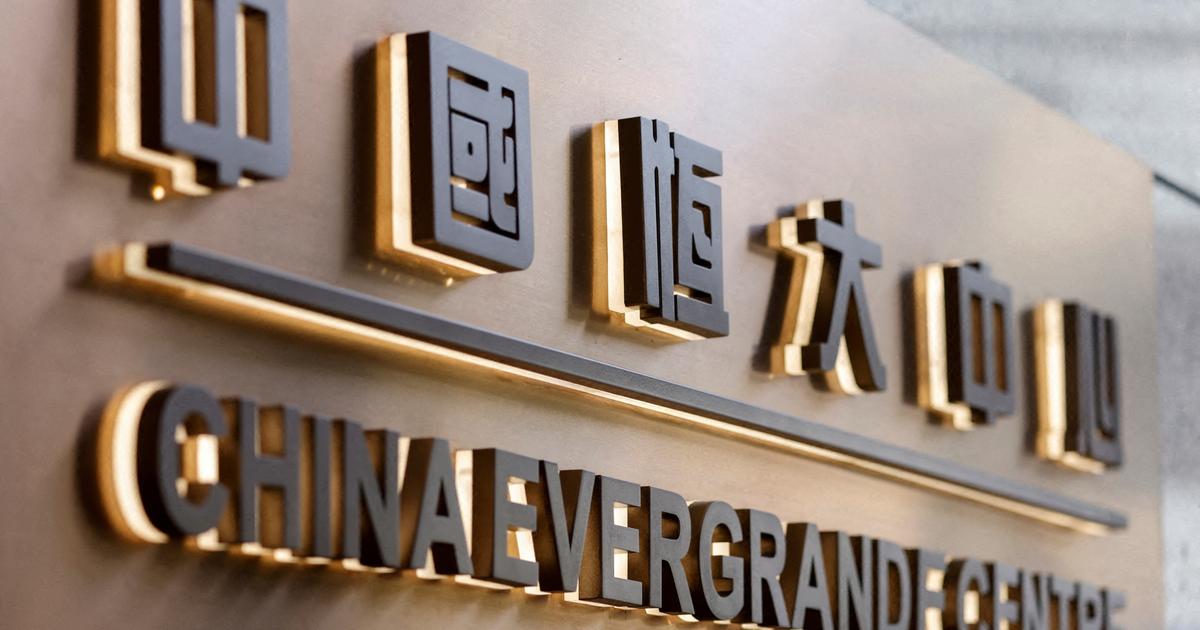The mainland regulatory storm continues, and the latest blow to the education sector, New Oriental Education (9901) last Friday (23rd) a sharp drop of 40%, not only scared many retail investors, but also caused a wave of stocks in China's concept stocks!
Under the gloom of supervision, the weakness of Hong Kong stocks is not over!
However, Xu Changtai, chief market strategist for the Asia Pacific region of JP Morgan Asset Management, did not say too much about the market outlook.
Since there are regulatory risks, investment may as well adapt to this new normal. In an interview with "Hong Kong 01", he pointed out that there are still three sectors with lower regulatory risks in Hong Kong stocks that deserve attention. Among them, there are options for stable interest collection and long-term growth. Industry, and technology stocks that have been "suppressed" can start to be considered, but it is important not to choose companies with too single business.
Xu Changtai pointed out that the outlook for the Hong Kong stock market should not be too weak. If supervision becomes clearer, the worst will pass.
﹙Profile Picture﹚
The Hang Seng Index hovers between 27,500 and 29,500 in the second quarter. Entering the third quarter, the performance is even weaker. It once staged an offensive and defensive battle of 27,000 points. The performance of both new economic stocks and value stocks was disappointing, but Xu Changtai pointed out that the outlook for the market outlook should not be too weak. It is expected that the Hang Seng Index will be supported by about 26,000 points. "Hong Kong stocks will be more cautious in the third quarter. If supervision becomes clear, the worst will pass, and stock valuations will reach a more attractive level. It may drive the overall performance of Hong Kong stocks."
He continued that the recovery of the local economy has been slower, so the rebound of local real estate stocks is not strong enough. In addition, mainland technology companies are subject to regulatory restrictions, whether it is due to financial systemic risks, anti-monopoly platforms, and even paying attention to customer personal information. Risks such as leakage have made market sentiment more cautious.
"However, if the economic recovery accelerates and value stocks rebound, the performance of Hong Kong stocks in the fourth quarter is expected to be better than that in the third quarter."
Domestic banks increase regulatory risks and reduce risks
Hong Kong stocks lost their luster this round. One of the reasons is that the mainland has strengthened the supervision of various industries, and the technology sector has blown up a data security storm. Even the education industry has "reduced" (reducing the burden of students' homework and off-campus training in compulsory education) documents.
In a strong regulatory environment, since there is no way to escape, it is better to start with "reverse thinking" and find industries that are already in the eyes of regulatory winds. Chinese banking stocks are just one example.
Xu Changtai pointed out that the market is worried about the risk of regulatory policies. You might as well consider that the banking industry has always been the most rigorously regulated industry. Therefore, the risk of traditional banks needing to increase supervision is relatively small. "(Moreover) the dividend rate of domestic banking stocks is higher, even if the market No performance, but earning at least 5% interest is already considered good.” Bloomberg data shows that Bank of China (3988), China Construction Bank (0939), Agricultural Bank (1288), ICBC (1398) 2021 forecast interest rates ranging from 7 to 9 Li, attractive to the appetite family.
The market is worried about the risks of regulatory policies. Xu Changtai pointed out that investors can consider industries that have the most stringent regulations, such as the banking industry.
﹙Profile Picture﹚
Continue to look at new energy stocks
On the other hand, with the support of national policies, Xu Changtai is also optimistic about industries related to renewable energy such as solar power panels and wind power.
Speaking of this sector, in fact, it has long been favored by the market. President Xi Jinping stated in September last year that China will strive to reach its peak carbon dioxide emissions by 2030 and strive to achieve carbon neutrality by 2060.
In fact, a lot of new energy stocks have taken the lead in speculation in the second half of last year. Whether it is photovoltaic stock Xinyi Solar (0968), wind stock Longyuan Power (0916), or electric vehicle BYD (1211), the share price will be at least within half a year. Doubled.
However, at the beginning of the year, the market sentiment was not good. Many new energy stocks with huge cumulative gains have also corrected with the market, frightening many investors.
Although the stock price is relatively volatile in the short-term, the prospects are still bright if you start from the mid-to-long-term perspective.
"I am optimistic about the long-term growth of the environmental protection industry in the next 10, 20, and 30 years. The industry prospects are positive. You may choose the leading company. You also need to look at the company's production capacity, supply chain stability, and balance sheet stability." Xu Changtai Said.
Supported by national policies, the demand for solar photovoltaic panels has increased sharply, and the market is optimistic about the prospects.
﹙Profile Picture﹚
As for other less controversial industries, such as the consumer goods industry, even if there is policy supervision, it is expected that the supervision will be relatively light.
Xu Changtai pointed out, “Consumer products such as daily necessities are subject to less regulatory risks. For example, sports goods are not well regulated. You may wish to pay attention to other consumer goods sectors.” Under the weak Hong Kong stock market, sporting goods stocks have outperformed. Among them, Li Ning (2331) and Anta ( The year-to-date increase has been about 75% and 45% respectively. They are regarded as typhoon shelters in the supervision of storms. At present, they are a little bit overcrowded.
Technology stocks have multiple businesses
Turning back to the technology sector that has been hit by the regulatory storm, the performance is eclipsing.
The Hang Seng Technology Index dropped from a high of 11,001 points in February to the current level of about 7,300 points, a cumulative decline of more than 30%. According to statistics, its market value has evaporated by US$551 billion since it peaked.
Xu Changtai stated clearly that technology stocks have indeed fallen into disability due to regulatory impacts. You can start to consider them. However, you must choose leading technology stocks with multiple businesses instead of just doing one business. "If a technology company owns FinTech (financial technology), For many businesses such as commerce, entertainment, games, etc., if one of the businesses is regulated, at least other businesses can still operate as usual."
Conversely, for science and technology enterprises with only a single business model, if the regulation hits important items, the uncertainty will remain for a long time.
Therefore, whether or not to carry out flat goods depends on whether the company's business model is diversified.
Xu Changtai used an analogy, "If the company has four or five water lines, one or two lines of the house are subject to supervision, and the other three lines are still in operation, so the profitability stability will be higher."
, Affected by regulation, technology stocks have "fallen to a disability." Xu Changtai clearly stated that they can start to consider.
(Photo by Liang Pengwei)
Measure whether the business model has changed
At the same time, the technology industry is subject to regulation, and we need to pay attention to how tight the regulation will be and whether it will impact the business model.
Xu Changtai pointed out, "A FinTech is valued at 50 times, and a traditional bank is valued at about 10 times. If FinTech is regulated, more sufficient capital is required, and more procedures are required for trading. In this case, is the previous FinTech worth an overestimation? The value is worthy of discussion.” Therefore, even if some technology stocks fall to a good level, we still need to measure whether their business model will be different from before.
Based on the above-mentioned "tips" for stock selection, if science and technology companies want to have a few businesses and they must be successful, what is the point?
Taking ATMXJ as an example, Alibaba (9988) has diversified businesses, e-commerce platforms, and financial technology. It uses big data to form an ecosystem and has great development potential.
However, the biggest risk lies in the fact that Ant Financial's prospects have not been clear so far, and it is caught in the eye of regulation. The valuation situation is difficult to be finalized for the time being.
As for Meituan (3690), which is mainly engaged in food and beverage delivery business, Xiaomi (1810) sells smartphones, and JD Group (9618) is mainly engaged in e-commerce retail business. Among them, only Tencent (0700) seems to meet the requirements.
Looking at company information, as of the performance of the first quarter of 2021, value-added services including mobile games still accounted for the highest proportion of its revenue, reaching 54%, online advertising accounted for 16%, financial technology and corporate Services accounted for 29%.
Among them, revenue from financial technology and corporate services can grow 47% year-on-year to 39 billion yuan.
It can be seen that Tencent has at least four businesses, which can diversify risks. The average price-earnings ratio in the past five years has reached 35 times, and the current forecasted price-earnings ratio is about 30 times. Tencent's investment value is gradually emerging.
Morgan Asset Management Xu Changtai: The rebound of the Hang Seng Index depends on several China and Hong Kong factors




/cloudfront-eu-central-1.images.arcpublishing.com/prisa/VD7ONLCZSZBRRLBARPIUKVHOXI.jpg)







/cloudfront-eu-central-1.images.arcpublishing.com/prisa/KMEYMJKESBAZBE4MRBAM4TGHIQ.jpg)


